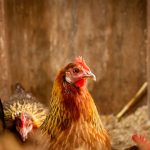Pecking behavior in poultry is a multifaceted issue with several potential causes. Overcrowding and limited space are primary factors, as confined conditions can lead to stress and aggression among chickens. Lack of environmental enrichment and boredom can also contribute to pecking, as chickens are naturally inquisitive and active animals that require mental and physical stimulation.
Nutritional deficiencies play a significant role in pecking behavior. An unbalanced diet lacking essential nutrients such as protein, vitamins, and minerals can result in abnormal behaviors, including feather pecking and cannibalism. Poultry owners must understand these underlying causes to effectively manage and address pecking issues.
Social dynamics within the flock also influence pecking behavior. Chickens have a hierarchical social structure, and instability or conflict within the group can lead to aggressive behaviors. The introduction of new birds to an established flock can disrupt the existing pecking order, potentially increasing aggression and pecking.
Understanding these social dynamics is crucial for maintaining a harmonious environment and addressing pecking behavior in poultry.
Table of Contents
- 1 Implementing Proper Nutrition and Diet
- 2 Providing Adequate Space and Enrichment
- 3 Managing Social Dynamics within the Flock
- 4 Addressing Health and Wellness Concerns
- 5 Using Behavioral Modification Techniques
- 6 Seeking Professional Guidance and Support
- 7 FAQs
- 7.1 What causes chickens to peck each other?
- 7.2 How can I prevent chickens from pecking each other?
- 7.3 What are some strategies for managing pecking behavior in chickens?
- 7.4 Are there any natural remedies to prevent chickens from pecking each other?
- 7.5 When should I seek professional help for pecking behavior in my chickens?
Key Takeaways
- Pecking behavior in chickens can be caused by various factors such as overcrowding, boredom, and social hierarchy issues.
- A balanced and nutritious diet is essential in preventing pecking behavior in chickens.
- Providing adequate space, enrichment, and distractions can help reduce pecking behavior in chickens.
- Managing social dynamics within the flock, such as introducing new birds properly, can help minimize pecking behavior.
- Regular health check-ups and addressing any wellness concerns can help prevent pecking behavior in chickens.
Implementing Proper Nutrition and Diet
Providing a Balanced Diet
Poultry owners should ensure that their birds are provided with a high-quality feed that contains the necessary protein, vitamins, and minerals to support their growth and development.
Addressing Nutritional Deficiencies
Additionally, offering supplemental treats and foraging opportunities can help prevent boredom and reduce the likelihood of pecking behavior. In cases where nutritional deficiencies are suspected to be contributing to pecking behavior, it is important to consult with a poultry nutritionist or veterinarian to develop a tailored feeding program for the flock. Supplementing the diet with specific nutrients or additives may be necessary to address deficiencies and promote healthy behaviors in the chickens.
Monitoring Body Condition and Access to Clean Water
It is also important to monitor the body condition of the birds and make adjustments to their diet as needed to ensure they are receiving adequate nutrition. In addition to providing a balanced diet, poultry owners should also ensure that their birds have access to clean water at all times. Dehydration can exacerbate stress and lead to abnormal behaviors such as pecking, so it is important to regularly check water sources and clean them to prevent contamination.
By implementing proper nutrition and diet management, poultry owners can help prevent and manage pecking behavior in their flock.
Providing Adequate Space and Enrichment

Adequate space and environmental enrichment are essential for promoting positive behaviors and reducing pecking behavior in poultry. Overcrowding can lead to stress and aggression within the flock, so it is important to provide enough space for the chickens to move around comfortably. The recommended space allowance for chickens varies depending on their breed and size, so poultry owners should research and adhere to appropriate space requirements for their specific flock.
In addition to providing sufficient space, environmental enrichment is crucial for keeping chickens mentally stimulated and engaged. This can include providing perches, dust bathing areas, and objects for pecking and scratching. Enrichment activities such as hanging treats or introducing novel objects into the environment can help prevent boredom and reduce the likelihood of pecking behavior.
Poultry owners should regularly assess the enrichment opportunities available to their birds and make adjustments as needed to keep them engaged and content. Furthermore, maintaining a clean and well-ventilated coop is important for promoting a healthy environment for the flock. Proper ventilation helps regulate temperature and humidity levels, which can reduce stress and prevent aggressive behaviors such as pecking.
By providing adequate space and environmental enrichment, poultry owners can create a positive living environment for their birds and minimize the risk of pecking behavior.
Understanding and managing social dynamics within the flock is crucial for preventing and addressing pecking behavior in poultry. Chickens have a natural pecking order, with dominant individuals establishing their rank within the group. However, conflicts can arise within the hierarchy, leading to aggressive behaviors such as pecking.
Poultry owners should observe their flock’s social interactions and intervene if necessary to prevent excessive aggression. Introducing new birds into an existing flock can disrupt the established social dynamics and lead to increased aggression and pecking behavior. To minimize conflict, it is important to carefully integrate new birds into the group gradually, allowing them to establish their place within the hierarchy without causing undue stress or aggression.
Additionally, providing multiple feeding and watering stations can help reduce competition and minimize aggressive behaviors during meal times. In cases where aggressive behaviors persist within the flock, separating individual birds or small groups may be necessary to prevent further harm. This allows the birds to be reintegrated into the flock once they have calmed down and established new social dynamics.
Poultry owners should closely monitor their flock’s social interactions and be prepared to intervene when necessary to maintain a harmonious environment and prevent pecking behavior.
Addressing Health and Wellness Concerns
Pecking behavior in poultry can also be influenced by underlying health and wellness concerns. Injuries, illness, or parasites can cause discomfort and stress in chickens, leading to increased aggression and pecking behavior. Poultry owners should regularly inspect their birds for signs of injury or illness, such as feather loss, wounds, or abnormal behavior, and seek veterinary care if necessary.
Additionally, maintaining good hygiene practices within the coop is important for preventing health issues that can contribute to pecking behavior. Regularly cleaning the coop, providing clean bedding, and practicing proper waste management can help reduce the risk of disease transmission and promote overall wellness in the flock. Poultry owners should also implement a regular parasite control program to prevent infestations that can cause discomfort and stress in chickens.
Furthermore, providing access to natural sunlight and outdoor ranging opportunities can promote overall wellness in poultry. Sunlight exposure is important for vitamin D synthesis and can help regulate mood and behavior in chickens. Allowing birds to range outdoors provides opportunities for natural foraging, dust bathing, and exercise, which can reduce stress and prevent abnormal behaviors such as pecking.
Using Behavioral Modification Techniques

Positive Reinforcement Training
One approach is to use positive reinforcement training to encourage desirable behaviors in the flock. For example, rewarding chickens with treats or praise when they exhibit calm and non-aggressive behaviors can help reinforce positive social interactions within the group.
Redirecting Pecking Behavior
Another technique is to use deterrents or distractions to redirect pecking behavior. This can include using visual barriers or introducing novel objects into the environment to disrupt aggressive interactions among the birds. By providing alternative outlets for natural behaviors such as pecking and scratching, poultry owners can help reduce the likelihood of aggressive pecking within the flock.
Consistency and Patience
It is important for poultry owners to remain consistent in their approach to behavioral modification and be patient as they work to address pecking behavior in their flock. Observing the birds’ responses to different techniques and making adjustments as needed can help determine the most effective strategies for managing aggressive behaviors.
Seeking Professional Guidance and Support
In some cases, addressing pecking behavior in poultry may require professional guidance from a veterinarian, animal behaviorist, or poultry specialist. These professionals can provide valuable insight into the root causes of pecking behavior within a specific flock and offer tailored recommendations for managing the issue. A veterinarian can conduct a thorough health assessment of the flock to identify any underlying medical concerns that may be contributing to aggressive behaviors such as pecking.
They can also provide guidance on nutrition, parasite control, and overall wellness practices that can help promote positive behaviors in poultry. An animal behaviorist or poultry specialist can offer expertise in understanding chicken behavior and social dynamics within flocks. They can provide recommendations for environmental enrichment, social management strategies, and behavioral modification techniques that are tailored to the specific needs of a poultry flock.
Additionally, joining poultry associations or online forums can provide valuable support from experienced poultry owners who have successfully managed pecking behavior in their flocks. Sharing experiences and seeking advice from others who have faced similar challenges can offer valuable insights and support for addressing pecking behavior in poultry. In conclusion, addressing pecking behavior in poultry requires a comprehensive approach that considers various factors such as nutrition, space, social dynamics, health concerns, behavioral modification techniques, and professional guidance.
By understanding the root causes of pecking behavior and implementing appropriate management strategies, poultry owners can create a harmonious environment for their flock and promote positive behaviors among their birds.
If you’re struggling with keeping your chickens from pecking each other, you may want to consider the size of your coop. According to a helpful article on Poultry Wizard, the size of the coop can have a big impact on the behavior of your chickens. To learn more about how big your coop needs to be for your chickens, check out this article.
FAQs
What causes chickens to peck each other?
Chickens may peck each other due to overcrowding, boredom, stress, or a lack of proper nutrition. In some cases, pecking may also be a result of a pecking order within the flock.
How can I prevent chickens from pecking each other?
To prevent chickens from pecking each other, provide adequate space in the coop, ensure they have access to a balanced diet, offer environmental enrichment such as perches and dust baths, and minimize stressors in the environment.
What are some strategies for managing pecking behavior in chickens?
Strategies for managing pecking behavior in chickens include providing distractions such as hanging treats or mirrors, separating aggressive birds, using anti-pecking sprays or ointments, and addressing any underlying health or environmental issues.
Are there any natural remedies to prevent chickens from pecking each other?
Some natural remedies to prevent chickens from pecking each other include adding herbs like oregano or garlic to their diet, providing access to fresh pasture or forage, and using essential oils with anti-pecking properties.
When should I seek professional help for pecking behavior in my chickens?
If pecking behavior in chickens becomes severe or persistent despite efforts to address it, it is advisable to seek professional help from a veterinarian or poultry expert. They can help identify underlying issues and provide guidance on managing the behavior.
Meet Walter, the feathered-friend fanatic of Florida! Nestled in the sunshine state, Walter struts through life with his feathered companions, clucking his way to happiness. With a coop that’s fancier than a five-star hotel, he’s the Don Juan of the chicken world. When he’s not teaching his hens to do the cha-cha, you’ll find him in a heated debate with his prized rooster, Sir Clucks-a-Lot. Walter’s poultry passion is no yolk; he’s the sunny-side-up guy you never knew you needed in your flock of friends!







